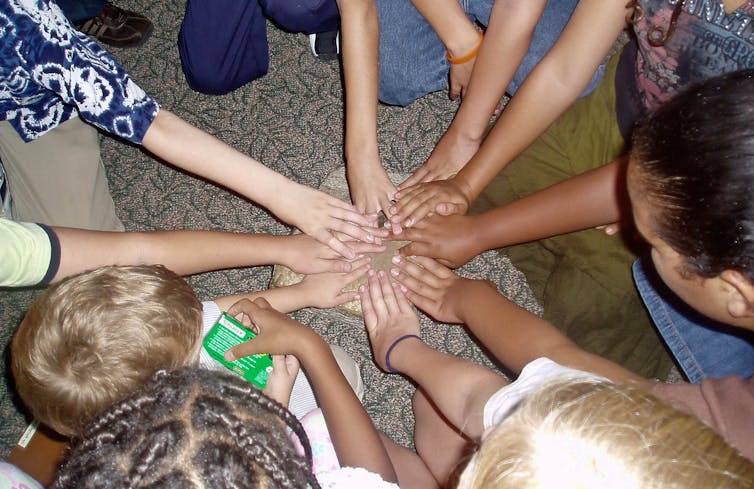How Can a Person Demonstrate Empathy Toward Others
This is the introductory essay in our series on understanding others' feelings. In it we volition examine empathy, including what it is, whether our doctors need more of it, and when too much may not be a practiced matter.
Empathy is the ability to share and understand the emotions of others. It is a construct of multiple components, each of which is associated with its own encephalon network. There are 3 ways of looking at empathy.
Start there is melancholia empathy. This is the ability to share the emotions of others. People who score high on affective empathy are those who, for example, show a strong visceral reaction when watching a scary movie.
They feel scared or experience others' pain strongly within themselves when seeing others scared or in hurting.
Cerebral empathy, on the other manus, is the ability to empathise the emotions of others. A skillful example is the psychologist who understands the emotions of the client in a rational way, simply does non necessarily share the emotions of the customer in a visceral sense.
Finally, there's emotional regulation. This refers to the ability to regulate one's emotions. For example, surgeons need to control their emotions when operating on a patient.

Another mode to empathise empathy is to distinguish it from other related constructs. For example, empathy involves self-awareness, every bit well equally distinction between the cocky and the other. In that sense it is unlike from mimicry, or faux.
Many animals might show signs of mimicry or emotional contagion to some other animal in pain. But without some level of self-awareness, and distinction between the self and the other, it is non empathy in a strict sense. Empathy is too different from sympathy, which involves feeling business for the suffering of another person and a desire to help.
That said, empathy is not a unique homo experience. It has been observed in many non-human primates and even rats.
People oft say psychopaths lack empathy simply this is not always the case. In fact, psychopathy is enabled past skillful cerebral empathic abilities - you need to sympathise what your victim is feeling when you are torturing them. What psychopaths typically lack is sympathy. They know the other person is suffering but they just don't care.
Inquiry has likewise shown those with psychopathic traits are frequently very practiced at regulating their emotions.

Why do we demand it?
Empathy is important because it helps u.s. empathize how others are feeling so nosotros can answer accordingly to the state of affairs. It is typically associated with social behaviour and in that location is lots of inquiry showing that greater empathy leads to more helping behaviour.
However, this is non always the case. Empathy tin too inhibit social deportment, or even lead to amoral behaviour. For example, someone who sees a car accident and is overwhelmed past emotions witnessing the victim in astringent pain might be less likely to assist that person.
Similarly, potent empathetic feelings for members of our own family unit or our own social or racial grouping might lead to hate or assailment towards those nosotros perceive every bit a threat. Think about a mother or father protecting their baby or a nationalist protecting their state.
People who are good at reading others' emotions, such as manipulators, fortune-tellers or psychics, might besides apply their excellent empathetic skills for their own benefit by deceiving others.

Interestingly, people with higher psychopathic traits typically evidence more utilitarian responses in moral dilemmas such as the footbridge problem. In this thought experiment, people have to decide whether to push a person off a bridge to end a train about to kill five others laying on the rails.
The psychopath would more often than not choose to push button the person off the span. This is following the commonsensical philosophy that holds saving the life of five people past killing one person is a good thing. And so 1 could argue those with psychopathic tendencies are more moral than normal people – who probably wouldn't push button the person off the bridge – as they are less influenced by emotions when making moral decisions.
How is empathy measured?
Empathy is often measured with cocky-report questionnaires such every bit the Interpersonal Reactivity Alphabetize (IRI) or Questionnaire for Cerebral and Affective Empathy (QCAE).
These typically ask people to indicate how much they hold with statements that mensurate different types of empathy.
The QCAE, for instance, has statements such equally, "It affects me very much when i of my friends is upset", which is a mensurate of melancholia empathy.

Cognitive empathy is determined by the QCAE past putting value on a statement such as, "I try to look at everybody's side of a disagreement earlier I make a decision."
Using the QCAE, we recently establish people who score college on affective empathy have more grey matter, which is a drove of different types of nerve cells, in an area of the brain chosen the anterior insula.
This area is oft involved in regulating positive and negative emotions by integrating ecology stimulants – such every bit seeing a car accident - with visceral and automated bodily sensations.
Nosotros also plant people who score higher on cognitive empathy had more greyness matter in the dorsomedial prefrontal cortex.
This area is typically activated during more cerebral processes, such as Theory of Mind, which is the ability to attribute mental beliefs to yourself and another person. It likewise involves understanding that others have behavior, desires, intentions, and perspectives different from one's own.
Can empathy be selective?
Research shows nosotros typically feel more than empathy for members of our own group, such as those from our ethnic group. For example, one report scanned the brains of Chinese and Caucasian participants while they watched videos of members of their ain indigenous group in pain. They besides observed people from a different ethnic group in pain.

The researchers constitute that a brain area called the inductive cingulate cortex, which is oftentimes agile when we encounter others in pain, was less active when participants saw members of ethnic groups different from their ain in pain.
Other studies have institute brain areas involved in empathy are less active when watching people in hurting who act unfairly. We even see activation in brain areas involved in subjective pleasure, such equally the ventral striatum, when watching a rival sport squad fail.
Nevertheless, we exercise not always experience less empathy for those who aren't members of our ain group. In our recent study, students had to give monetary rewards or painful electrical shocks to students from the same or a dissimilar university. We scanned their brain responses when this happened.
Encephalon areas involved in rewarding others were more active when people rewarded members of their own group, but areas involved in harming others were as active for both groups.
These results correspond to observations in daily life. We generally feel happier if our own group members win something, just nosotros're unlikely to harm others just considering they belong to a different grouping, culture or race. In general, ingroup bias is more most ingroup dearest rather than outgroup hate.

Yet in some situations, it could exist helpful to feel less empathy for a particular group of people. For example, in war it might be beneficial to feel less empathy for people you are trying to kill, particularly if they are also trying to harm you.
To investigate, we conducted another brain imaging written report. Nosotros asked people to watch videos from a violent video game in which a person was shooting innocent civilians (unjustified violence) or enemy soldiers (justified violence).
While watching the videos, people had to pretend they were killing real people. Nosotros establish the lateral orbitofrontal cortex, typically active when people damage others, was active when people shot innocent civilians. The more than guilt participants felt most shooting civilians, the greater the response in this region.
However, the same area was not activated when people shot the soldier that was trying to kill them.
The results provide insight into how people regulate their emotions. They besides show the brain mechanisms typically implicated when harming others become less agile when the violence confronting a particular group is seen as justified.
This might provide hereafter insights into how people become desensitised to violence or why some people feel more than or less guilty about harming others.
Our compassionate brain has evolved to exist highly adaptive to dissimilar types of situations. Having empathy is very useful as it often helps to understand others and then nosotros tin can aid or deceive them, just sometimes we need to be able to switch off our empathetic feelings to protect our own lives, and those of others.
Tomorrow's article will look at whether art can cultivate empathy.
Source: https://theconversation.com/understanding-others-feelings-what-is-empathy-and-why-do-we-need-it-68494
Post a Comment for "How Can a Person Demonstrate Empathy Toward Others"